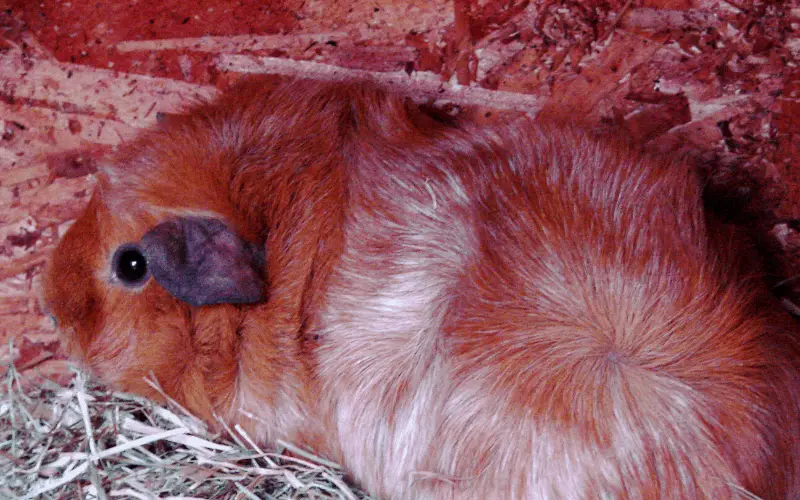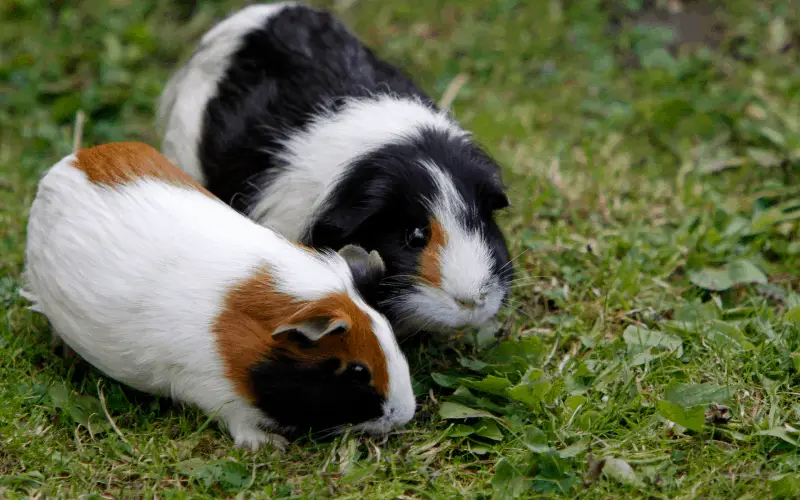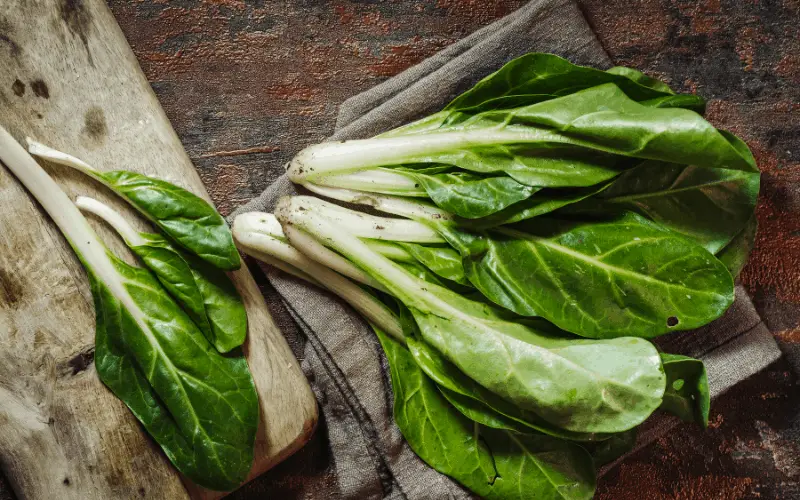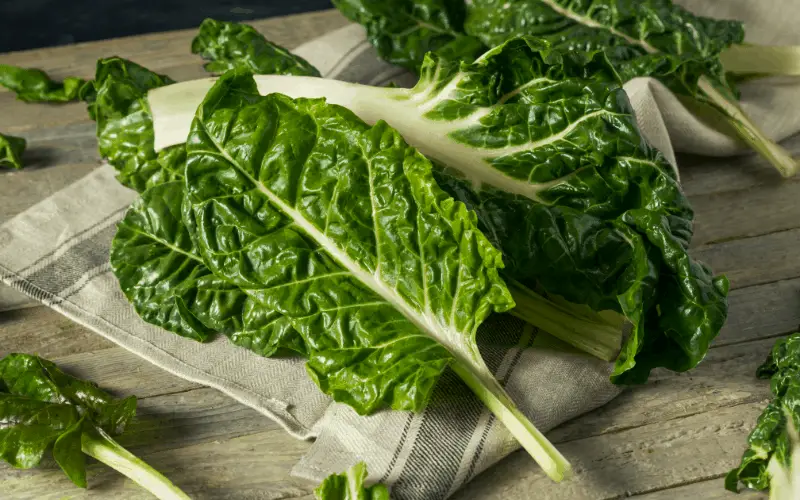Feeding your guinea pig is the most vital part of caring for your little pet. Guinea pigs have to eat carefully selected foods that are full of nutrients, and one of the most typical things to feed your guinea pig is hay.
You can also add nutritional pellets for good measure. Sometimes, you should give your guinea pig a treat, and vegetables are available for that.
Vegetables have lots of nutrients that will benefit the guinea pigs. One such nutrient-filled vegetable is the chard, also called Swiss chard.
But can guinea pigs eat chard? Yes! Guinea pigs can eat chard as they contain several essential nutrients for their survival. We’ll discuss more why you should feed your guinea pig with chards later in this article.
Let’s get started!
What Is Chard?
Chard is a vegetable with green leaves. Like most green vegetables, chard has nutritious leaves. This makes it popular for dieticians. Chard looks a lot like beets and cardoons, and several chefs have used them to make food for centuries.
You see, cooks use them to make omelets, soups, stir-fries, and salads. Some chefs go the extra mile to use the leaves for wrapping tortillas.
Cooking chard will reduce the number of nutrients in it but will reduce its bitter taste. And this is good news since our guinea pigs do not eat cooked food anyway.
Read Also: How Much Hay Do Guinea Pigs Need?
Can Guinea Pigs Eat Chard?

Like I said earlier, you’re 100% free to feed your guinea pigs with chard. Chad is full of essential minerals, vitamins, and antioxidants. These are all beneficial to your pet.
Now, let us quickly take a look at some of the key nutritional content of chard and its benefits to our pets.
Nutritional Content of Chard
Chard is full of vitamin K and Vitamin A, and both are needed for the body to function correctly. Vitamin K aids in wound healing and recovery from wounds.
They help the body produce a substance that allows the blood to clot during injuries, so one does not bleed out. For every 100 g of chard, there is 830 mcg of vitamin K.
Vitamin A helps the liver, heart, and kidney to do their work well. For every 100 g of chard, there is 6116 IU of vitamin A.
Chard contains vitamin C. 100 g of chard supplies 30 mg of ascorbic acid (vitamin C). Guinea pigs cannot produce nor store vitamin C, so they need to get it from what they eat.
Your pets need to get enough vitamin c because it is necessary for an improved immune system. It helps prevent and fight against opportunist infections.
Chard also contains phosphorus, calcium, iron, carotene, magnesium, polyphenol, and they are all important to the body.
Advantages of Feeding Chard to Guinea Pigs
Can guinea pigs eat chard? Yes, they can. There are many advantages to giving your pets a chard to eat. Some of them are listed below.
1. Chard Helps Combat Scurvy
Like we mentioned before, guinea pigs cannot make or store their vitamin C and are prone to suffering from scurvy. Scurvy is a deficiency disease due to the shortage of ascorbic in the body.
And to make sure the guinea pig is safe from scurvy; you need to give them foods that will supply at least vitamin c of 30mg daily.
This is where the chard comes in as they are rich in vitamin C. give your pets chard and never worry about them having scurvy.
2. Chard Improves the Eyesight of Guinea Pigs
Naturally, guinea pigs do not have fantastic eyesight, and this condition worsens as they grow older.
Feeding the guinea pig with foods rich in vitamin A will help keep the already impaired vision from deteriorating. Chard has enough vitamin A content that will help do just that.
3. Chard helps Your Guinea Pig Recover Quickly from Injuries
Vitamin A and Vitamin K are abundant in chard. They provide the guinea pigs rich nutrients that can help strengthen the immune system and help them recover quickly if they are injured.
Vitamin K, particularly, has a substance that quickens the blood clotting process. This is essential as it causes the body to stop bleeding in the event of an injury.
Think of what will happen if the guinea pig hurt themselves, and they keep bleeding for several minutes. Your pets would run out of blood and die.
4. Chard Helps Maintain the Coat of the Guinea Pig
Chard has a rich amount of carotene, and beta carotene is responsible for helping the body assimilate other essential nutrients. It refreshes and smoothens the coat of your pet.
Disadvantages of Feeding Guinea Pigs With Chard

If you feed your pets with chard in moderation, there would be no problem. But when you give them chard in excess, it becomes a challenge to their health. Moderation at this point is vital.
Vegetables like beet greens, chard, and spinach are great nutrient sources for your pets, but they have too much oxalic acid, and it is not suitable for the pets to take them in excess.
As a rule of thumb, you should not feed the guinea pig with oxalic acids above 50 grams daily. Take a look at some of the health challenges that could arise if guinea pigs take too much chard.
1. Diarrhea
Guinea pigs have a delicate digestive system, and digestive problems are the first sign that your pet ate something it should not eat.
Diarrhea is one of the digestive issues that are common among diseased guinea pigs. If your guinea pig has diarrhea, then they need urgent help because it could be fatal.
2. Formation of Kidney Stones
When excess calcium and oxalate combine, they form stones in the bladder. This is the most typical disease in guinea pigs. These stones block the urinary tract of your pets and cause them significant discomfort while they pee.
Giving guinea pigs too much chard, which has both oxalate and calcium, leads to the guinea pig developing bladder stones. So, please provide them with the vegetable only in small quantities.
3. Kidney Failure
Kidney failure is another serious issue that can arise from guinea pigs digesting too much oxalate and calcium.
The stress on the urinary system will cause their kidneys to fail. In some severe cases, the guinea pigs die after suffering for too long. We bet no one wants that for their pets.
How Often Can Guinea Pigs Eat Chard?
We have established that guinea pigs can feed on chard, but how much chard can they comfortably eat?
The digestive system of guinea pigs is such a delicate thing and should not be trifled with. Moderation is vital in whatever you give your pet. Guinea pigs overeating chard will lead to health challenges.
You should feed your guinea pig with chard just three times a week. Let three times be the upper limit. Ensure you serve the chard with other vegetables like cilantro, bell pepper, and lettuce.
We advise against giving your guinea pigs chard to eat every day. A small amount of guinea pig is enough for your pig at every serving.
Do note that chards contain calcium and oxalate acids. And even though these are instrumental in forming healthy teeth and bones, they are also problematic when digested in excess. This is because they cause the formation of stones in the bladder and kidney.
Not just that, they also cause stress on the urinary system by making the guinea pigs pee all too often. Constant urination and bladder or kidney stones are the perfect recipes for renal failure, and in some extreme cases, death.
How to Prepare Chard for Guinea Pigs
Preparing the chard for guinea pigs is not rocket science. Here are things you can do to prepare the chard.
The first thing to do is to select chards of excellent and fresh quality. Your pets deserve the best so give it to them. Do not feed the guinea pigs with any leaf that shows signs of wilting. Do not also provide them with any leaf that was treated with chemicals.
The second step for you is washing your vegetable thoroughly. Dirt and chemicals will have debilitating effects on the guinea pig if they ingest them. Use salt and water to wash the chard under running water.
Then cut the vegetable into smaller pieces. Ensure that you mix them with other vegetables. The mixing is essential because the chard has a biting taste.
The guinea pig may not want to eat it if they taste and see that it is not very pleasant. When you mix with other green vegetables, the guinea pig will find it hard to drop or reject the chard.
Lastly, after feeding the guinea pig, remove uneaten vegetables from your pet’s cage. Food remnants and uneaten food particles attract flies and rats. And both of them are bad for your pet.
Frequently Asked Questions about Guinea Pigs and Chards
Can You Feed Your Guinea Pig Chard Stem?
Another part of the chard that you can give your pet is the stem of the guinea pig. The stems are chewable and can feed the guinea pig quite well. Guinea pigs love munching on the stem of chards because they are crunchy.
Can You Give Guinea Pigs Chard Leaves to Eat?
While we generally know that chard is okay for the guinea pigs to eat, it is important to know which part of the chard is palatable for them to eat. The leaves of chard are okay for your chard to eat. You have to prepare it very well before giving it to them.
Can You Give Your Guinea Pigs Rainbow Chard?

You can most certainly feed your guinea pigs with rainbow chard.
Can Guinea Pigs Eat Red Chard?
It is safe for your guinea pigs to eat chard. But considering that there are various types of chards, one may want to know if all the chard types are safe for your guinea pigs to eat. And here is the good news!
All kinds of chard, even the red chard, are okay for the guinea pig to eat. But you have to take care not to give the guinea pig more than two leaves at once.
Can You Give Guinea Pigs Boiled Chard?
Guinea pigs cannot eat boiled chard, and this is not just about chard. Your pets cannot eat any cooked food.
They cannot also eat any food containing spices, oils, or other condiments for making food. These materials are harmful to your guinea pig. Anything you will feed your guinea pig must be raw.
Boiling the chard will also lead to leaching of the vitamins. Vitamin C is a vitamin that is affected the most. If vitamin C is absent in the chard, why feed it to the guinea pig at all?
Can You Give Guinea Pigs Frozen Chard?
Just as the guinea pigs can’t eat boiled chard, they cannot also eat frozen vegetables. Thaw the vegetable before you give it to your pet.
Frozen or cold chards will cause diarrhea for your pets. Serve the chards to the guinea pigs at room temperature.
Can You Give Your Pets Chard and Kale?
Kale is another vegetable that is packed with nutrients. Pet owners sometimes combine the chard and kale to feed their guinea pigs. Is this okay? Yes. You can give chard and kale to your pets. They are a powerful combo.
Like the chard, the kale has a lot of calcium, so give your guinea pigs this combination with other vegetables that have less calcium content.
Also, feed the guinea pigs this combination moderately. They should not eat them more than two times a week.
What Else Can Guinea Pigs Eat?
If you are looking for more information, walkthroughs and troubleshooting about Guinea Pigs and their diet, here are some additional posts you can check out:
Conclusion
Can guinea pigs eat chard? Yes, guinea pigs can eat chard. They are a great source of Vitamin C, Vitamin A, and Vitamin K.
Not to mention other nutrients that are laden in the chard. While this vegetable is such a nutritional powerhouse, you must give your guinea pigs this vegetable only in small amounts.
When you feed the guinea pig with chard in excess, they will cause diarrhea, kidney failure, balder stones, and sometimes death.
When you find out your pet is sick or has changed their habit, quickly take the pet to a vet, and have your pet checked out. But remember, prevention is better than cure. Give your guinea pigs chard, but only in small quantities.
